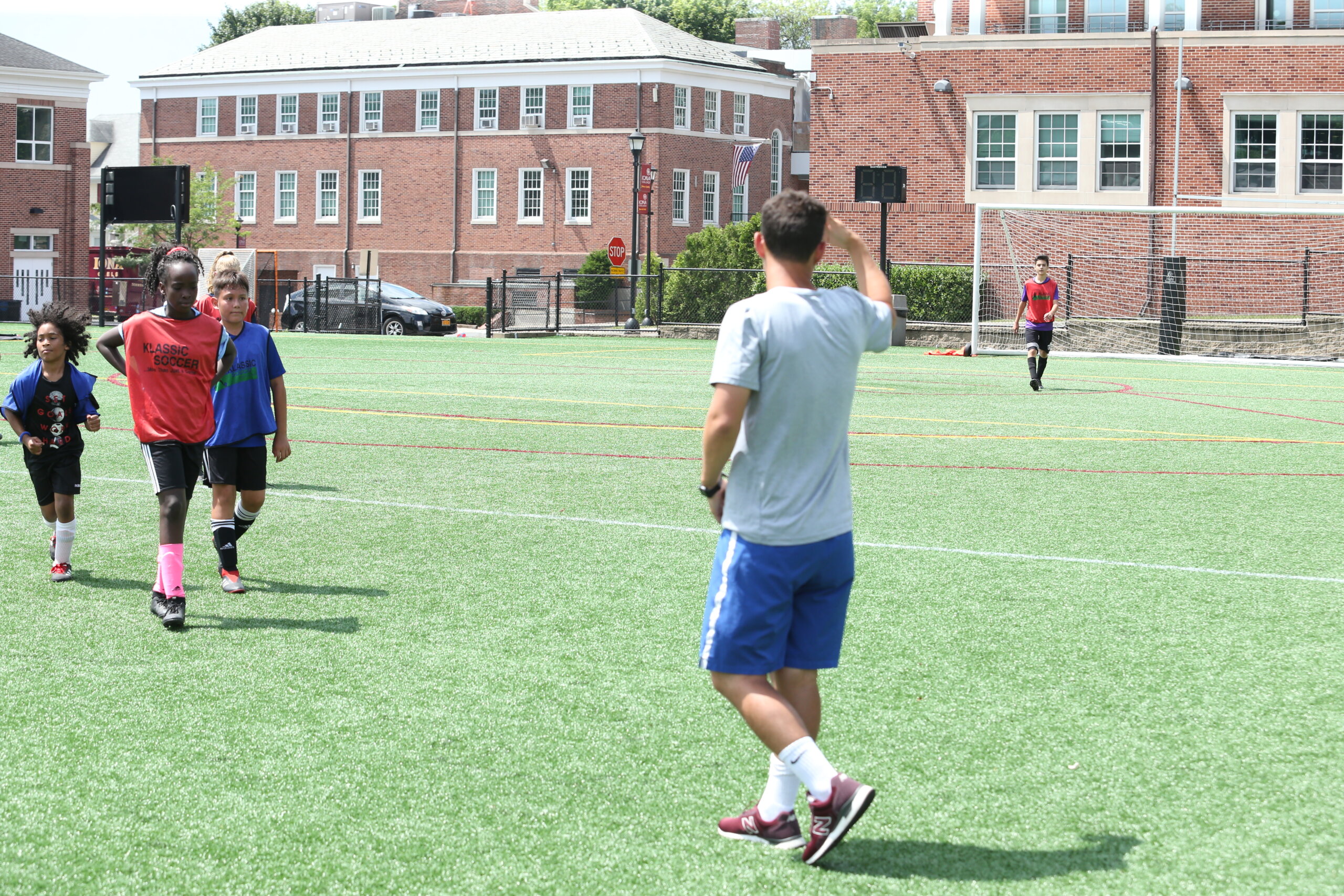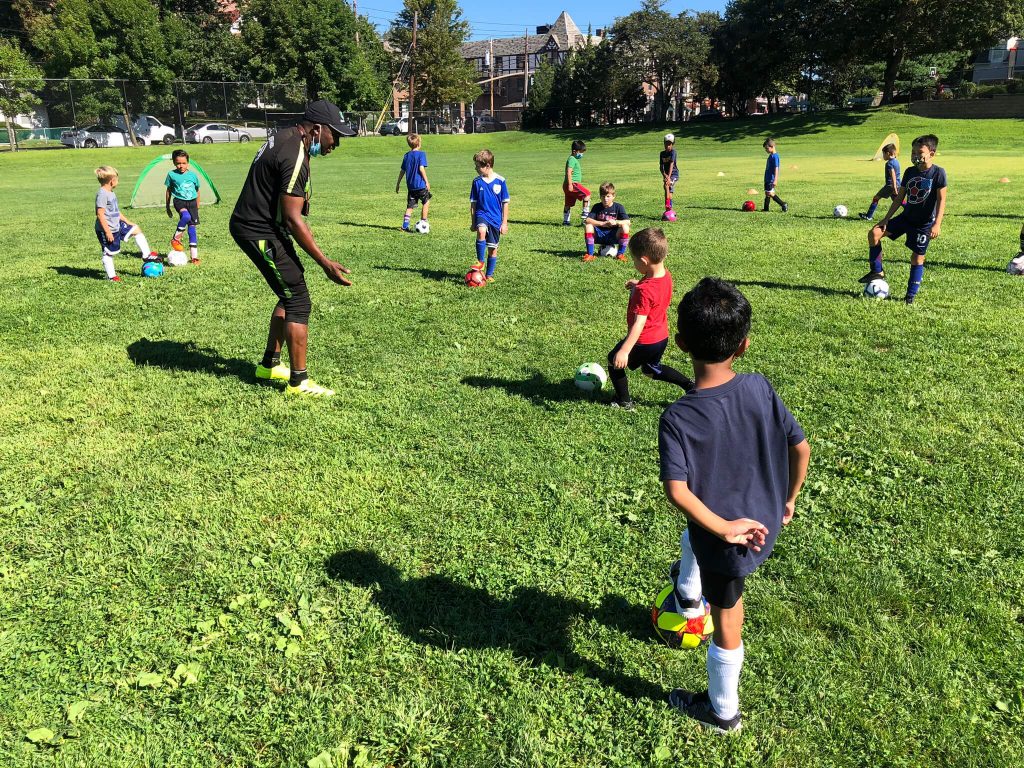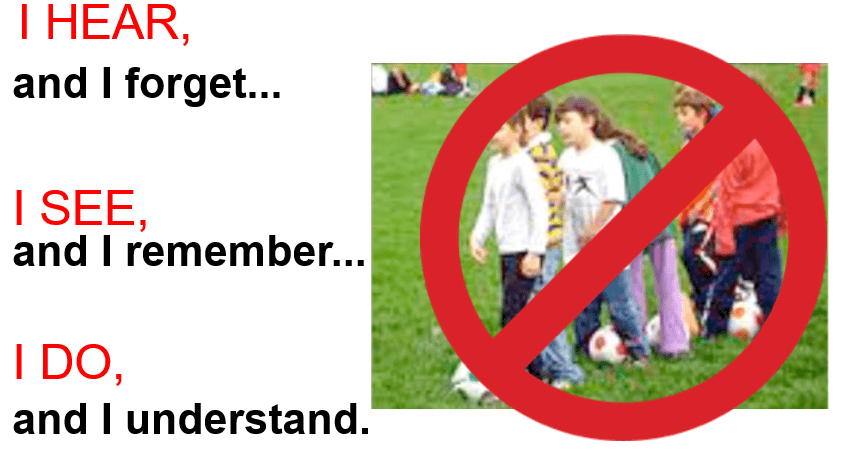Stand Out To See In

“Observation is the one thing we tend to forget about in the long line of qualities needed as a coach, you know, with selecting teams, organizing training sessions, dealing with parents…but observation is what you have to depend on at the end of the day.
When I was looking for knowledge during my coach education and structure which I could use in terms of training programs and how to go about them, I learned it was important not to forget the observation part.
Sometimes, we can get ourselves trapped in the middle of a training session and we don’t see anything. To watch it and observe it is important.” according to Sir Alex Ferguson, UEFA Technician.
Sage on Stage

I remember when I completed my D license I had learned how to control a training session. The buzz word then and is now, is ‘FREEZE!!’ Shouted with authority players immediately standstill. I was now in control of my training sessions. I could get players to be quiet while I explained what went wrong, and how it should be fixed.
Clearly, I had all the answers for what went wrong, why it went wrong, and how it should be fixed. I was a MOTO – Master of the obvious.
I remember training my U14 girls’ team in Mamaroneck one Saturday afternoon. I had a great relationship with the girls so after I froze a play, Ryan, a player from Pelham, had a frustrated look on her face. When I questioned further she was annoyed because her former coach would constantly FREEZE the practice and then provided a long-winded coaching message.
A few years after, I realized how poorly was my coaching when I visited Real Madrid’s Valdebebas training ground. I attended a training session for U12/13 boys. I watched from the stands for close to 45 minutes. During that time the number of stoppages by the coach was zero. the coach stopped the play to make coaching points was Zero.
Is Listening Learning

What do you think would be the average time for a youth coach to start issuing instructions at a game or training session? Quite often it takes less than 60 seconds. Yes, that’s right, less than a minute into play the coach steps into the field or yells from the sidelines.
Coaches like to talk. That’s what coaches do. When you are constantly talking, giving instructions, commanding, and directing, many parents view this as money well spent. Their child is being told what to do, and in their mind, this is best for their learning.
At your next practice, when you step freeze play to coach, ask yourself what happened and why did it happen.
Observe, Don’t Just Watch

Many youth coaches associate ability to coach with their former playing ability. Coaches, especially being an ex players, , you have a standard of what the game should look like. It is not uncommon to see, as soon as play starts, they are coaching, supporting, encouraging and telling their players what to do, what happened, what to do next.
What is not happening reading the game to understand…what, when, why, where, and who of the moments and actions. When you watch a session you are not gathering information (observing). Often times coaches who watch, their eyes only follow the ball. You correct players’ actions on the ball. Basically, the coach is trapped in the middle.
Coaches who are effective at coaching observe play by viewing from the outside in. When you observe a practice or a game, you need to take notes.


When you observe, you see tendencies, behaviors, and patterns involving individuals and the team. These habits cannot be detected in 60 seconds or less.
The Game
“The most revealing piece of sports science you can ever watch is a football (soccer) game.” according to Sir Alex Ferguson. The game provides countless opportunities for the development of both players and coaches.
Before you start coaching, whether a game or practice, you should develop the skill to observe by following these principles.
- Time
At the very least, observe play for 10 – 15 minutes without coaching. Players need time to Experience -> Reflect -> Adapt -> Apply while they play the game. Your players cannot understand the demands of the game after 60 seconds. Many coaches start coaching too early. - Note Taking
Recording a sequence of events prevents forgetting something important. Jot down what’s happening with your players, and also what’s happening with the opposition. - The Ball
The main focal point of a game is the ball. The movement of the ball and the movement of the body with the ball changes decisions. It is the main driver of play around which the entire game revolves. - Opponents
Train your eyes to watch the opposition especially during the start of each half. The better the opposition, the greater the difficulty. - Teammates
Observe what is happening with your players and the team. Is there cooperation, understanding, and support? Do they argue and blame each other? - Objectives
Analyze if the objectives are being met. Are these being accomplished, if not, why not? - Stress
What is limiting time and space for your players? What other factors are pressuring your players? Are parents coaching from the sidelines? - Weather
Is this a cold chilly day with a temperature below 40 degrees Fahrenheit? It is above 90, with high humidity. - Field Surface
Are you playing on turf, grass outside, or hardwood or concrete? What is the impact on the play? - Officials (Rules)
How is the referee calling the game? Is he moving quickly? Are his assistants, other refs, or parents?
In order for you to understand the challenges these difficulties present for your team and players, you have to learn the skills to observe and record what is happening before you start coaching.
Identifying where your players are experiencing problems helps you to prioritize their challenges.
How do you go about observing your games and practice? Shoot me a response below.
References
UEFA Futsal Coaching Manual
The Coaching Philosophies of Louis van Gaal & the Ajax Coaches
UEFA Technician. No. 55, November 2013
Leave A Comment